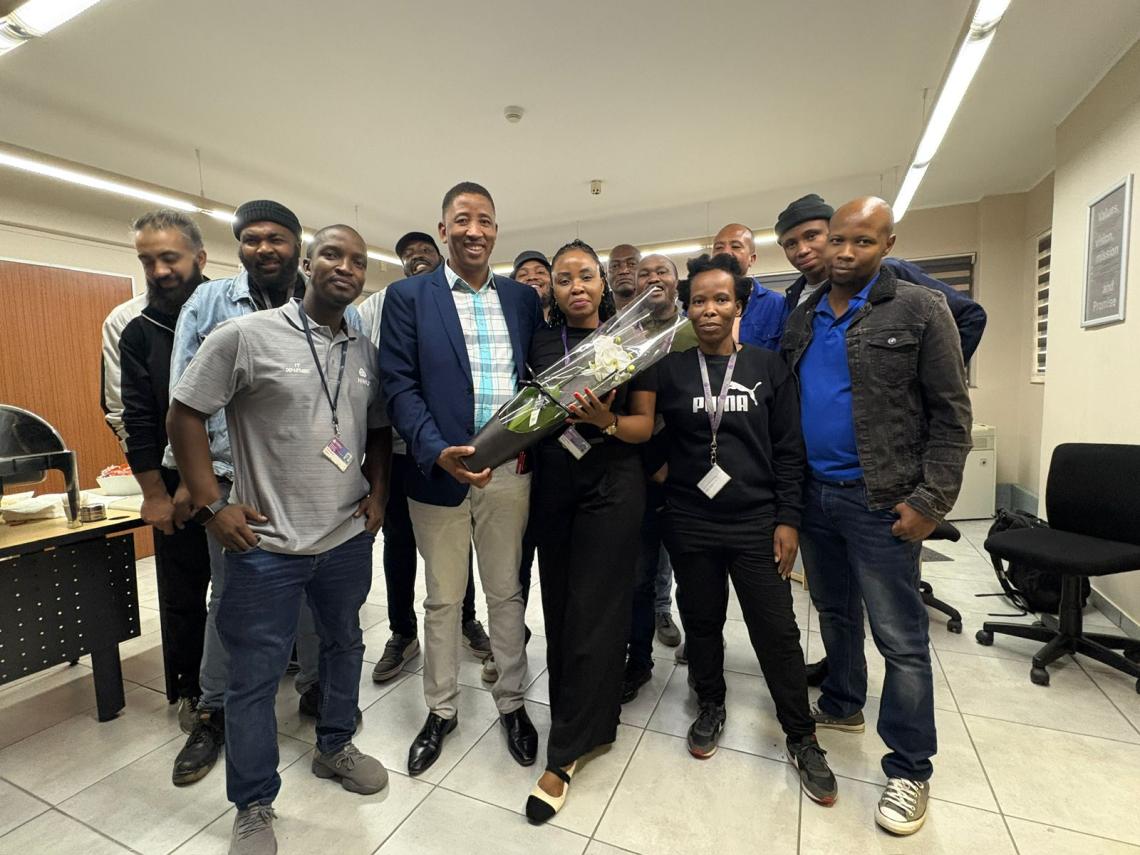Double major in Physics and Computer Science? That’s not a degree, that’s a superpower! Tshepo Sikwa took on two of the most intense fields at NWU and lived to tell the tale. Now, he’s solving real-world tech problems as an IT trainee, from untangling printer issues to configuring routers like it’s second nature. His journey is a mix of high-stakes deadlines, late-night “aha” moments, and discovering that the real secret to tech isn’t just code, it’s communication, curiosity, and sometimes, energy drinks. We caught up with him to talk about academic highs, the project that lit his fire for networking, and the advice he wishes every student could hear.
.jpg)
Let’s start with the now: what does a day in your life as a trainee at the NWU IT Department look like? Give us a behind-the-scenes peek into your current role!
A day in my life as a trainee at the NWU IT Department is full of learning opportunities. I usually start my day by checking emails and any assigned tickets on the IT helpdesk system. These involve anything from troubleshooting different issues day in and day out, depending on the end users(clients). Tackling issues like Printer issues, assisting users remotely with any issue they encounter, Supporting Conference boardrooms, troubleshooting software and hardware, and some days involve networking, which has always been my favourite part of IT, including tasks like configuring routers or switches and understanding how network protocols work in real time.
During quieter moments, I spend time studying or working on internal projects that help me improve processes within the department. Overall, it’s a structured environment that allows me to apply my knowledge freely, gain hands-on experience, and grow professionally in the IT field as I encounter different clients and enhance my communication skills daily.
What made you choose Computer Science and Physics? That combo isn’t for the faint of heart! Were there any “aha” moments, role models, or passions that led you there?
Honestly, it was a mix of curiosity, challenge, and a deep love for understanding how things work both in theory and in practice. From a young age, I was fascinated by how technology could solve real-world problems, and I have always been trying to understand how apps and machines worked behind the scenes. That naturally drew me to Computer Science. On the other hand, Physics spoke to a different part of me that I wanted to explore the fundamental laws of nature, to ask "why" and "how" on the deepest levels.
Combining both fields wasn’t an easy choice, but I didn’t want to give up either. I saw them as two powerful courses: Physics for understanding the universe, and Computer Science for shaping the future.
So yes, it’s been a tough road at times, but also incredibly rewarding. Choosing this path wasn’t just about what I was good at; it was about what lit that spark in me.
Looking back on your undergraduate journey at NWU, what were some standout moments, the highs, the challenges, and the turning points?
Looking back on my undergraduate journey at NWU, several standout moments come to mind, each one shaping me in unique ways.
The Highs:
One of the most memorable highs was the sense of community and support I found through student organisations and campus events. Participating in academic competitions and collaborating with peers on research projects and assignments gave me a sense of accomplishment and motivated my passion for my field. I also cherished the moments when hard work paid off like passing a particularly tough module after long nights of studying.
The Challenges:
There were moments when I felt overwhelmed, especially during exam seasons or when balancing academics with personal responsibilities. Adapting to pace and workload in the first year was also a tough transition. Group assignments sometimes came with their own set of challenges, from conflicting schedules to communication issues. But through it all, I learned resilience, time management, learning to work on my own and the importance of asking for help when needed.
The Turning Points:
A major turning point came when I failed an assignment that I had worked hard on. It forced me to reassess my approach to learning and pushed me to engage more with lecturers, seek feedback, and take initiative in my academic growth.
Overall, my time at NWU was a journey of growth both academically and personally. It wasn't always easy, but each experience added a layer to who I am today.
How did NWU support your growth, both academically and personally, during your studies?
NWU played a major role in my growth both academically and personally through a combination of supportive people, valuable opportunities, and a learning environment that pushed me to develop beyond the classroom.
Academically, I had lecturers who genuinely cared about our success. They weren’t just there to deliver content they were mentors who encouraged questions, gave constructive feedback, and challenged me to think critically. There were moments when I struggled, and their support made all the difference. Some even helped guide me toward specific areas of interest, like simulations and systems development, which shaped my academic path.
The library, computer labs, and online learning platforms also made it easy to access resources whenever I needed them. Especially during project-heavy periods, having that kind of access was a lifesaver.
On the personal side, NWU’s support systems were incredibly valuable. Having the student counselling services, academic workshops, or even just peer support through study groups, I always felt there was help available when I needed it. Being part of certain student organizations and tech communities also gave me a platform to grow my confidence and communication skills.
One of the biggest growth factors was the diverse student environment. Collaborating with people from different backgrounds and working on team projects exposed me to new ways of thinking, which has been just as important as anything I learned from a textbook.
So overall, NWU didn’t just help me earn a degree it helped me grow into someone who’s more resilient, resourceful, and ready to keep learning long after graduation.
Would you say your degree helped prepare you for the real-world tech space? In what ways?
Yes, I’d say my degree helped me prepare for the real-world tech space though not always in the ways I expected.
Academically, it gave me a strong foundation in problem-solving, logical thinking, and core technical skills like programming, algorithms, and data structures. These are fundamental tools in any tech job and having that solid base has been a big advantage. The Physics component also sharpened my analytical thinking and mathematical modelling skills, which come in handy when working on data-heavy or systems-based problems.
But beyond the technical side, what surprised me was how much the degree helped me develop soft skills like perseverance, attention to detail, and learning how to teach myself when I hit a wall. Those late nights debugging code or trying to make sense of a complex physics concept really prepared me for the reality of tech work, where you're constantly troubleshooting, learning new tools, and adapting to fast-changing requirements.
Group projects and lab work also taught me the importance of teamwork and communication, which are critical in the industry. Whether it's collaborating on code or presenting ideas to non-technical teammates, those skills have proven just as valuable as any technical knowledge.

Tell us about a project, assignment, or moment during your studies that really pushed you or sparked your curiosity.
Individual Network Simulation Project whereby we used the Packet Tracer network simulator to design and simulate different computer network topologies. Okay!!
The goal was to simulate how data packets travel across a network, accounting for factors like congestion, routing algorithms, and latency.
What made it especially challenging and exciting was that I had to design and build the simulation from scratch. There wasn’t a step-by-step guide, just a set of requirements and the freedom to figure out how to implement them. I had to think deeply about how real-world networks operate, then model that behaviour using code in a way that was both efficient and realistic. There were moments when it felt overwhelming, especially when I hit bugs or saw performance issues I couldn’t immediately explain. But that also pushed me to dive deeper into networking protocols, study how routers make decisions, and explore different algorithmic approaches. I even added some visualisation elements to track how packets moved through the network, which made the simulation more intuitive and rewarding to work with. It was a video presentation submission whereby you explain how you build, display how data is sent from one topology to another one, show results if the message arrived which route it took to destination and tracks the route used.
Looking back, that project didn’t just sharpen my problem-solving skills it opened my eyes to how complex and dynamic network systems really are. It also solidified my interest in systems thinking, and how even small technical decisions can impact performance and reliability at scale. That was when I developed more interests in networking.
What advice would you give to current students who are still trying to figure things out, whether academically or career-wise?
Understanding what you are studying is the first thing as a student to focus on. Learning to explore your course and following related course channels will help in career choice.
It's completely okay not to have everything mapped out right away. University is not just about academics, it's about discovering who you are, what excites you, and where you see yourself growing. So, if you’re feeling uncertain about your major, career path, or future in general, you’re not alone and that feeling doesn’t mean you’re failing. It means you’re exploring. Focus on building skills, not just collecting grades. Communication, problem-solving, teamwork, time management are just as valuable as any technical knowledge, and they open doors in surprising ways. Also Don’t rush your timeline. Growth isn’t a race. Everyone figures things out at their own pace. What matters is being intentional about learning and staying open to change. So, trust the process. You don’t need all the answers today, you just need to keep asking the right questions and be brave enough to explore the answers as they come.
What’s something surprising about working in IT that you didn’t expect as a student?
As a student, I was focused on learning programming languages, algorithms, and solving technical problems. I assumed that success in Tech World would be mostly about technical skills. But once I entered the professional world, I quickly realized that communication, teamwork, and adaptability are just as critical.
For example, working on a real-world system often means collaborating with non-technical stakeholders who don't speak "tech." Being able to explain complex ideas in simple terms, listen actively, and manage expectations has been a big part of the job.
Another unexpected aspect is how important continuous learning is. New tools, frameworks, and technologies emerge constantly, and staying up to date is part of the job description. In university, you work towards fixed syllabus and exams. In the workplace, the learning never really stops, and no one hands you a textbook or a deadline.
So, in short, IT is just as much about solving human problems as it is about solving technical ones. That’s been eye-opening and surprisingly fulfilling.
What’s the coolest tech trend or innovation you’re currently obsessed with?
Right now, I’m really obsessed with the rise of AI-powered personal agents like digital assistants that can truly think, plan, and act on your behalf across multiple platforms. We're moving beyond simple chatbots into agents that can automate workflows autonomously.
Okay, quick-fire round!
Coding or debugging? Debugging
Coffee or energy drinks? Energy Drinks
Sci-fi or superhero movies? Superhero Movies
Early bird or night owl? Night Owl



